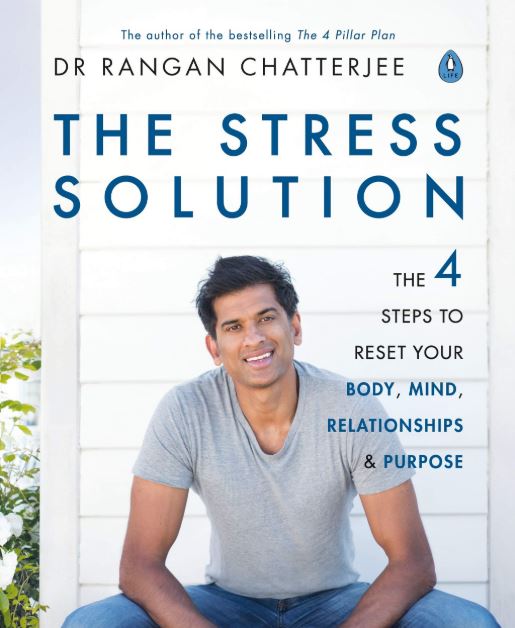Is healthy weight loss one of your New Year Resolutions? TV Doctor Rangan Chatterjee is here to help with three practical key tips
‘Everyday in my practice people ask me how they can lose weight,’ says Dr Rangan Chatterjee, who appeared in BBC One series Doctor In The House and has released a new book, The Stress Solution: The 4 Steps to Reset Your Body, Mind, Relationships and Purpose.
Healthy weight loss is the question on all of our lips. It’s the new year, and ‘new year new me’ weight loss resolutions are everywhere.
From your neighbour looking to drop a dress size before summer or a family member trying to slim down for a wedding. Many people see the New Year as a fresh start to incorporate some new healthy habits and routines.
Doctor Rangan Chatterjee is here to help with that with his top three healthy weight loss tips.
Healthy weight loss tip #1 Get Enough Sleep
When we don’t sleep well and are not fully rested, two important hormones called leptin and ghrelin, known as the appetite and hunger hormones can be affected.
These hormones are both responsible for letting us know when we are full up and when we are hungry. If these hormones aren’t sufficient we could end up feeling hungry even when we aren’t. This will result in eating more than you need to, which certainly won’t help if weight loss is your goal.
If these hormones aren’t sufficient we could end up feeling hungry even when we aren’t.
A study looking into whether sleep duration may be an important regulator of body weight and metabolism saw 1,024 volunteers report on their sleep habits through questionnaires and sleep diaries.
Fasted blood samples were evaluated too for leptin and ghrelin (the two key opposing hormones in appetite regulation).
The study found that participants with less sleep had reduced leptin and elevated ghrelin. The differences in the two hormones leptin and ghrelin were said to be a likely cause of increased appetite.
The study noted that in Western societies, where chronic sleep restriction is common and food is widely available, changes in appetite regulatory hormones may contribute to obesity.
Healthy weight loss tip #2 Stress
Nowadays we are all busy. Busy checking emails, busy running to meetings, busy taking phone calls, busy, busy, busy.
We are living in a stress epidemic and when we are chronically stressed our bodies feel as though they are under attack. Because of this our bodies will then hold on to any excess weight.
Stress overload leads to a fight or flight response being triggered in our bodies. This causes the release of various hormones, including cortisol. Once the adrenaline has worn off, we will still have cortisol in our system.
Don’t underestimate the importance of a morning routine.
Excess cortisol in our system means we may crave less healthy food options that contain higher sugar levels and fat content thus affecting your weight. Cortisol breaks down muscles for energy not fat, which will slow your metabolism down even further.
Don’t panic though (you’ll only increase those cortisol levels!) Simple solutions can be made daily to help you reduce your stress and hopefully your weight too.
Try having 15 minutes of ‘me’ time everyday. This can involve reading a book or magazine, listening to an audiobook, watching your favourite TV programme or having a relaxing bath.
‘Don’t underestimate the importance of a morning routine’, says Doctor Chatterjee. Having a morning routine where you wake up slightly earlier, get yourself organised, have a healthier breakfast and even go to the gym could greatly reduce your stress levels. There are also plenty of meditation apps available for you to try.
Healthy weight loss tip #3 Eat food in 12 hour window
Similar to intermittent fasting where you have to eat all your food in an eight hour window, Doctor Chatterjee suggests we eat all of our food in a slightly less extreme time of 12 hours. This is also known as Time Restricted Feeding (TMR), and modern science has shown this can be helpful for weight loss.
‘We are not evolved to eat food 24/7 and eating in just 12 hours is much more in line with your bodies natural rhythms such as digestion and hormone release’ says Doctor Chatterjee.
Doctor Chatterjee suggests we eat all of our food in a time of 12 hours.
A study was performed during Ramadan, the holiest month in the Islamic calendar where Muslims fast during the month. Most Muslims fast for 11-16 hours a day and limit exercise to avoid fatigue.
Participants of this study included 81 students from Tehran University of Medical Sciences. Participants weight, body mass index (BMI), glucose and cholesterol were evaluated before and after Ramadan.
Results showed that body weight, BMI and glucose all decreased during Ramadan fasting in both men and women.
Therefore this simple yet highly effective tip is an easy one to stick to if you are struggling to find the time to get to the gym but still want to shed a few pounds.
Doctor Rangan Chatterjee‘s new book The Stress Solution: The 4 Steps to Reset Your Body, Mind, Relationships and Purpose is out now.
Follow Dr Rangan Chatterjee on Instagram, Twitter and Facebook.
More Healthista Content:
5 natural remedies for constipation
Got insomnia? This hand reflexology massage could help
Running for beginners – 7 steps to getting started
Can intermittent fasting help this compulsive eater lose weight?
Like this article? Sign up to our newsletter to get more articles like this delivered straight to your inbox.






















































